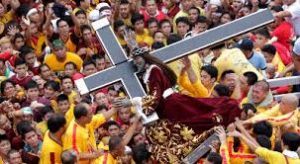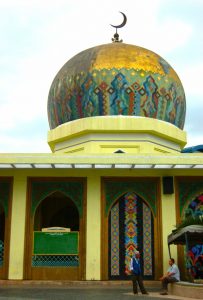Interfaith Harmony Week, Manila
"Love, Mercy and Compassion in the Religions": Seminar for Young People
“Religion Matters but the Differences in Religions Do Not….”
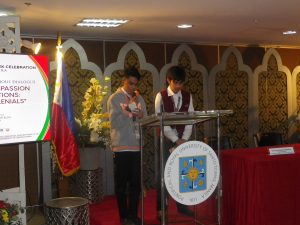 The Philippines is becoming more and more diverse when it comes to faith traditions. The Catholic Bishops Conference of the Philippines in response to this need particularly the need to address conflict and misunderstandings between two major faith traditions Islam and Christianity in the country established the Episcopal Commission for Interreligious Dialogue in 1990. The interreligious commission also serves as a response to the call of the Second Vatican Council for the Church to work with ‘moderate elements’ for peace, justice and harmony.[1] The commission is chaired by Bp. Angelito R. Lampon, OMI with Fr. Carlos Reyes as the Executive Secretary. Among it’s objectives are to promote dialogue with followers of other religions like Buddhism, Hinduism, Islam, and the indigenous religions and to establish linkages with different Centers of inter-religious work in the Philippines.
The Philippines is becoming more and more diverse when it comes to faith traditions. The Catholic Bishops Conference of the Philippines in response to this need particularly the need to address conflict and misunderstandings between two major faith traditions Islam and Christianity in the country established the Episcopal Commission for Interreligious Dialogue in 1990. The interreligious commission also serves as a response to the call of the Second Vatican Council for the Church to work with ‘moderate elements’ for peace, justice and harmony.[1] The commission is chaired by Bp. Angelito R. Lampon, OMI with Fr. Carlos Reyes as the Executive Secretary. Among it’s objectives are to promote dialogue with followers of other religions like Buddhism, Hinduism, Islam, and the indigenous religions and to establish linkages with different Centers of inter-religious work in the Philippines.
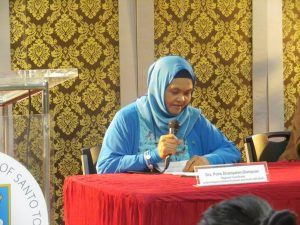 An important network the commission is working with is the UniHarmony Partners Manila. It was established in 2011 to bring together under one umbrella a network of faith based organizations which aims, through a series of activities, to spread the message of interfaith harmony, dialogue and cooperation as key elements towards nation building. Membership of the network includes about 25 groups from the different faith traditions around Metropolitan Manila. In 2016, it won the second prize of the King Abdullah II (Jordan) World Interfaith Harmony Week Awards. The Award is connected to an initiative launched by the King at the 65th session of the United Nation General Assembly, aimed at spreading awareness and understanding among interfaith dialogue groups through various international activities.
An important network the commission is working with is the UniHarmony Partners Manila. It was established in 2011 to bring together under one umbrella a network of faith based organizations which aims, through a series of activities, to spread the message of interfaith harmony, dialogue and cooperation as key elements towards nation building. Membership of the network includes about 25 groups from the different faith traditions around Metropolitan Manila. In 2016, it won the second prize of the King Abdullah II (Jordan) World Interfaith Harmony Week Awards. The Award is connected to an initiative launched by the King at the 65th session of the United Nation General Assembly, aimed at spreading awareness and understanding among interfaith dialogue groups through various international activities.
This year the the ECID in partnership with Uniharmony Partners Manila is again celebrating World Interfaith Harmony Week from Feb. 1-7, 2017. The World Interfaith Harmony Week was first proposed at the UN General Assembly on September 23, 2010 by H.M. King Abdullah II of Jordan. Just under a month later, on October 20, 2010, it was unanimously adopted by the UN and henceforth the first week of February will be observed as a World Interfaith Harmony Week.
As part of the week-long celebrations last February 2, 2017, they conducted a half-day seminar-workshop for the youth with the theme “Love, Mercy and Compassion Across Faith Traditions: Religion and the Millenials.” It was hosted by the Institute of Religion of the University of Sto. Thomas – Manila. The workshop aims to understand how the young people view religion and it’s relevance to them. It was participated by about 100 students from the different schools in Manila including probably the only Buddhist college in the Philippines, the Fo Guang Shan Buddhist College. A lot of the participants were Christians including Catholics but a good number of Muslims were also present.
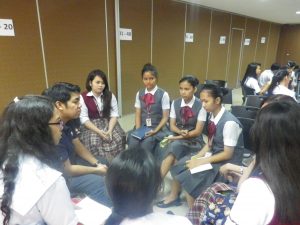 Inputs were given by four faith leaders from the faith traditions of Islam, Christianity, Buddhism and Hinduism. The representatives from these faith traditions highlighted the importance of religion to life regardless of age. Fr. Carlos Reyes (Catholic) mentioned the challenge young people present to church leaders. Ven. Master Miao Jing (Buddhist) narrated her own experience of falling in love with the Buddha when she moved to Taiwan and met her mentor who taught her the path of Buddha. Only three things are need in life to be happy she said, “diligence, perfect willing heart and spreading good or happiness.” Dr. Shakutala Vashwani (Hindu) highlighted the meaning of the Hindu greeting “Namaste” which means “I bow before the divine or holy in you.” She explained all of us have souls to which she refers to as atma. We are all therefore sacred. She also explained that some people think Hindus have plenty of Gods but she clarified that since we do not know exactly who God is but perceive him or her in many different ways, the Hindus gave their god many different names and faces or images but there is only one God. Dr. Potri Diampuan (Islam) in her input shared that today marks a deeper islamophobia towards because of the news we hear and read about a few Muslims. She also explained important Islamic words and practices like haram, halal and jihad.
Inputs were given by four faith leaders from the faith traditions of Islam, Christianity, Buddhism and Hinduism. The representatives from these faith traditions highlighted the importance of religion to life regardless of age. Fr. Carlos Reyes (Catholic) mentioned the challenge young people present to church leaders. Ven. Master Miao Jing (Buddhist) narrated her own experience of falling in love with the Buddha when she moved to Taiwan and met her mentor who taught her the path of Buddha. Only three things are need in life to be happy she said, “diligence, perfect willing heart and spreading good or happiness.” Dr. Shakutala Vashwani (Hindu) highlighted the meaning of the Hindu greeting “Namaste” which means “I bow before the divine or holy in you.” She explained all of us have souls to which she refers to as atma. We are all therefore sacred. She also explained that some people think Hindus have plenty of Gods but she clarified that since we do not know exactly who God is but perceive him or her in many different ways, the Hindus gave their god many different names and faces or images but there is only one God. Dr. Potri Diampuan (Islam) in her input shared that today marks a deeper islamophobia towards because of the news we hear and read about a few Muslims. She also explained important Islamic words and practices like haram, halal and jihad.
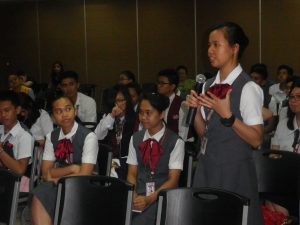 The highlight for me was the workshop when the participants were broken into groups. Each group were asked to answer three questions, create a slogan or motto and a symbol to capture what they think about the diversity of religions in the world and how it affects everyone. I was asked to facilitate one of these groups. The group is composed of students from Ramon Avancena National Highschool and Manuel L. Quezon University. They were highschool students, a mix of Muslims and Catholics, three boys and four girls. They were asked what religion means to them, if religion is still relevant and if how did they experience love, mercy and compassion of a person of another faith tradition.
The highlight for me was the workshop when the participants were broken into groups. Each group were asked to answer three questions, create a slogan or motto and a symbol to capture what they think about the diversity of religions in the world and how it affects everyone. I was asked to facilitate one of these groups. The group is composed of students from Ramon Avancena National Highschool and Manuel L. Quezon University. They were highschool students, a mix of Muslims and Catholics, three boys and four girls. They were asked what religion means to them, if religion is still relevant and if how did they experience love, mercy and compassion of a person of another faith tradition.
Religion for them meant: love, belief, sacrifice, worship, culture, happiness, traditions and peace. All of them believe religion is relevant to the young people because religions is a step to learning, about knowing what is good and bad, knowing about each other and to respect, to find the Truth. Religion is a reflection of your self.
One Christian girl shared how in the beginning she did not want to enroll to her present school because there were a lot of Muslims. She taught of them as war-freaks, violent and impatient. But later on experience their generosity to her. The other girl a Muslim also shared how she never wanted to befriend Christians because they were considered traitors. She didn’t trust Christians. But she felt something is wrong and she decided to reach out and found out she was wrong. Christians are also very helpful and will try to help whenever they can. But one girl later added that the differences in religion did not matter to her – they were all her friends.
Religion matters to these young people but the differences in religion does not – as their slogan said in Filipino, “Anuman ang relihiyon ng bawat isa, i-respeto, maging masaya tungo sa pagkakaisa.” It literally means whatever religion each one has, respect them, be happy that leads to unity.
At the end of the seminar-workshop, Msgr Hernando Coronel, rector and parish priest of the Minor Basilica of the Black Nazarene gave his closing remarks. Quiapo Church as it is popularly known is near the Masjid al-Dahab or Golden Mosque, one of the larger mosques around Manila. It can hold about 3,000 people. The Minor Basilica has an active ministry for interreligious dialogue and co-sponsored the seminar-workshop.
“Black Nazarene Procession, 2017” “Masjid al-Dahab, Quiapo, Manila”
The week-long celebrations is marked by different activities hosted by various groups who are members of the Uniharmony Partners Manila network like hijab day, interfaith dinner and more seminars and workshops specially for young people. Participation in this network has been helpful in building relationships with like-minded and like-hearted individuals to promote dialogue as a way of life.
[1] https://www.insightonconflict.org/conflicts/philippines/peacebuilding-organisations/episcopal-commission-interreligious-dialogue/

